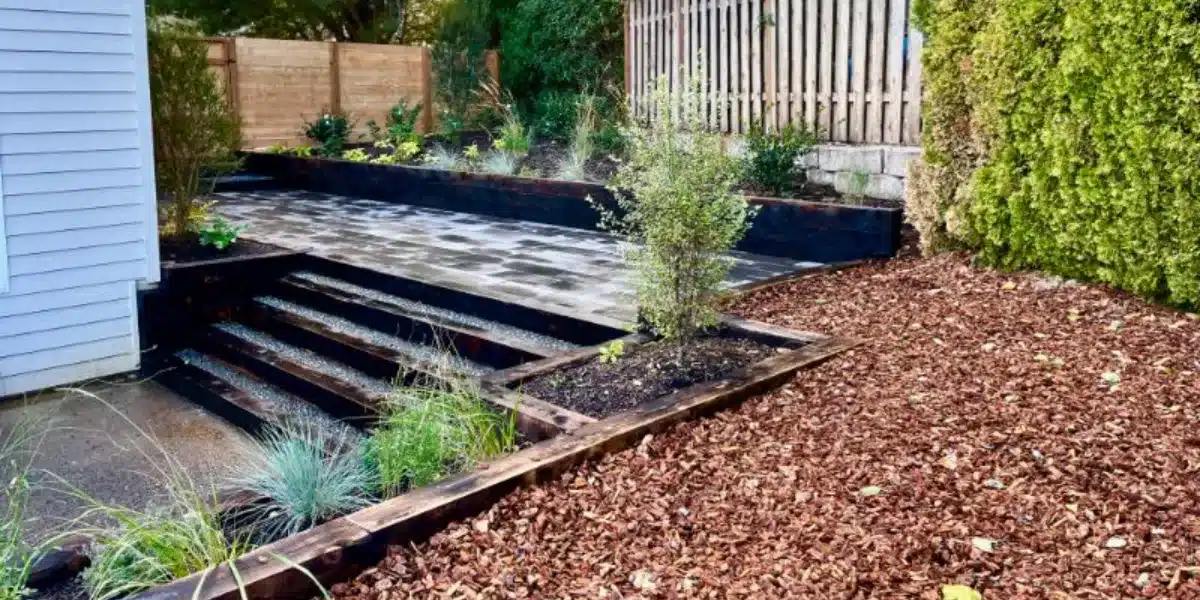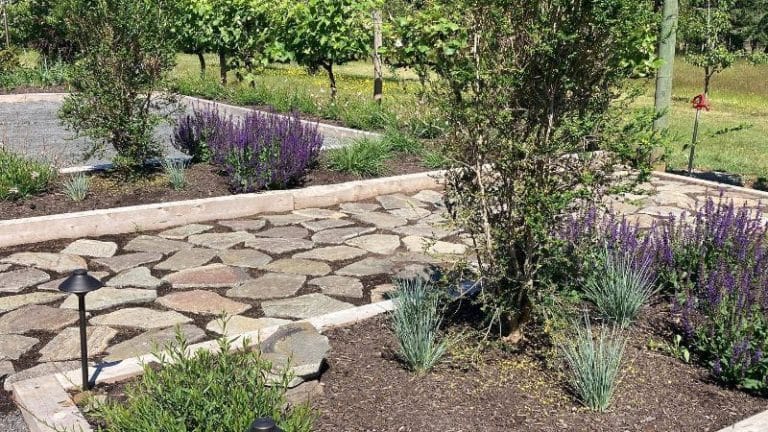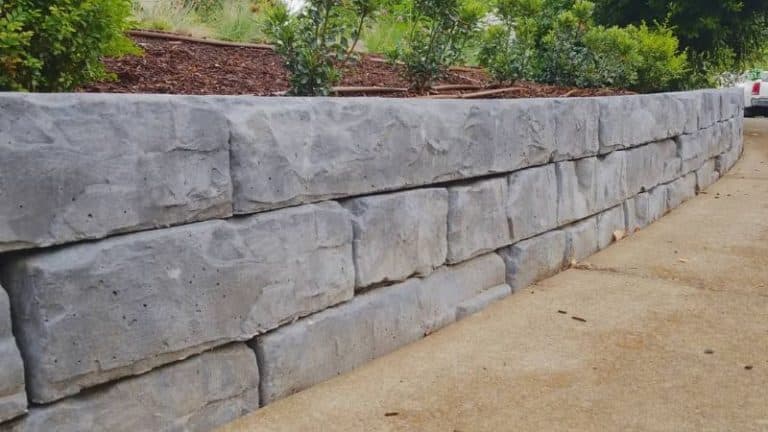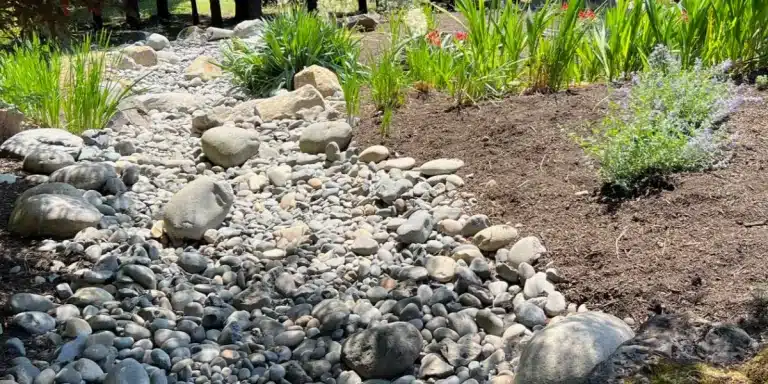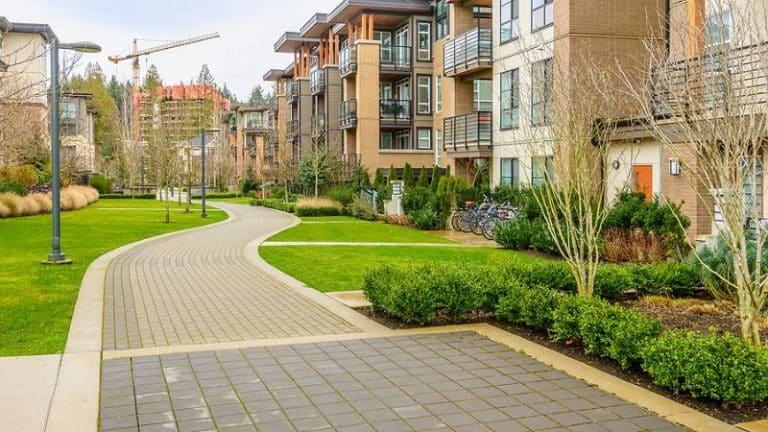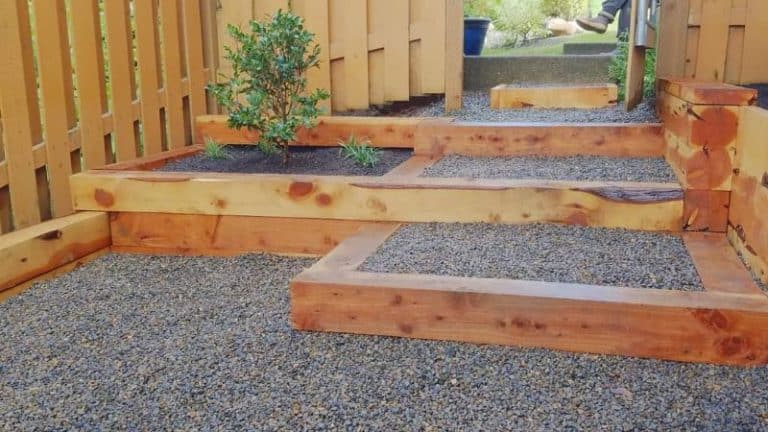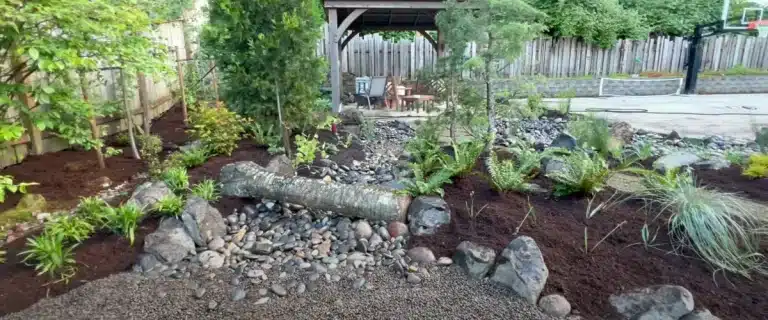What to Do When Your Mulch Keeps Washing Away
If your mulch disappears every time it rains, you’re not alone. In the Pacific Northwest, where frequent and heavy rainfall is the norm, mulch washout is a common landscaping problem. Not only is it frustrating and costly to replace, but it also exposes your soil to erosion, increases weed growth, and leaves your landscape looking unfinished.
At White Oak Landscapes, we help homeowners throughout Oregon City, West Linn, and surrounding areas prevent mulch erosion through smart landscape design and proven solutions tailored to local conditions.
Why mulch washes away in the first place
To fix mulch erosion, it’s important to first understand what’s causing it. In many properties throughout Oregon City, West Linn, and surrounding areas, the problem stems from a combination of soil conditions, slope, and lack of structural containment.
Here are the most common reasons mulch won’t stay in place:
-
- Improper slope or grading
When your landscape slopes downhill and lacks any form of retention, gravity will pull mulch away with every rainfall. This is especially common in sloped front yards or hillside planting beds. - Poor drainage
Areas where water collects or flows rapidly across the surface can quickly displace mulch. Fast-moving runoff carves through garden beds, carrying mulch with it and exposing the soil below. - Lightweight or low-quality mulch
Finely shredded mulch, sawdust blends, and certain wood chips are more likely to float, shift, or blow away. These materials don’t offer enough weight or structure to resist wind and water. - No edging or barriers
Without physical boundaries, mulch can spill into lawns, walkways, and nearby drains. Beds without edging tend to lose shape and require constant cleanup and replenishment. - Bare or unprotected soil
On steep slopes or high-traffic areas, mulch alone isn’t enough to stay in place. If the underlying soil is compacted or lacks vegetation, it offers no grip to anchor the mulch during wet weather.
- Improper slope or grading
These issues are especially common in Clackamas County landscapes, where compacted clay soils and frequent rain create ideal conditions for erosion and runoff. At White Oak Landscapes, we assess these variables as part of any mulch installation or landscape design project to ensure long-lasting results.
Effective solutions to stop mulch erosion
At White Oak Landscapes, we believe landscape materials should stay where they’re placed. If your mulch keeps washing away, it’s a sign your property needs a more thoughtful, professional approach to slope, drainage, and soil retention. We offer several long-term solutions that not only solve mulch erosion but also enhance the beauty and functionality of your outdoor space.
Here’s how we help homeowners across Oregon City, West Linn, and nearby communities keep their mulch in place:
1. Improve landscape grading
Water that runs too fast or in the wrong direction is one of the most common causes of mulch loss. Regrading part of your landscape can slow down surface runoff, redirect water away from vulnerable areas, and promote better absorption into the soil.
-
-
- We reshape the land to encourage natural drainage patterns
- Water is directed away from mulch beds and foundation areas
- The finished result looks natural and improves overall lawn health
-
In many cases, regrading also makes the yard easier to mow, plant, and maintain—improving both usability and curb appeal.
2. Install proper edging
Mulch without a border is like water without a container. That’s why we often recommend adding strong, attractive edging to keep mulch beds neat, defined, and erosion-resistant.
Popular edging options include:
-
-
- Steel or aluminum edging for a modern, low-profile finish
- Natural stone or boulder edging for rustic durability
- Paver borders that match your existing patio or walkway
-
These edges act as barriers that stop mulch from spilling into lawns or hardscape surfaces. They also help maintain the shape of your garden beds and visually tie your landscaping together.
3. Switch to heavier mulch or decorative gravel
Not all mulch materials hold up equally in wet weather. If you’re using fine mulch or wood shavings, it may be time to upgrade to a heavier, more erosion-resistant material.
We often recommend:
-
-
- Medium or coarse shredded bark mulch for better weight and coverage
- Bark nuggets that interlock and resist floating
- Decorative gravel for high-drainage areas or sloped beds
-
Gravel mulch is particularly effective for preventing washout while creating a clean, polished appearance. It’s also ideal for pairing with features like dry creek beds, paver walkways, and drought-tolerant planting.
4. Add terracing or retaining features
If your yard includes sloped garden beds, gravity will always be working against your mulch. The solution? Break up the slope with structural support that holds both soil and mulch in place.
We design and build:
-
-
- Terraced garden beds for multi-level planting and erosion control
- Low retaining walls using stone, pavers, or concrete blocks
- Integrated features like seat walls or planters that serve double duty
-
These features not only stop mulch from sliding downhill but also enhance visual interest, define usable space, and add long-term value to your landscape.
5. Improve drainage with strategic installations
If stormwater or roof runoff is repeatedly overwhelming your mulch beds, we may recommend drainage upgrades to manage water at the source.
Effective solutions include:
-
-
- Downspout extensions to carry water away from planting beds
- French drains or catch basins to collect and move subsurface water
- Drainage swales or dry creek beds to guide surface runoff gently through the landscape
-
Each of these can be blended into a larger landscape design plan, providing functional protection without compromising aesthetics.
Real-life example: Fixing a soggy, sloped garden bed in West Linn
A homeowner in West Linn reached out after repeatedly losing mulch from a planting bed along their front walkway. The slope faced the street and was hit hard every time it rained. Our team installed natural stone edging, regraded the area, added a decorative gravel blend for mulch, and redirected roof runoff with a downspout extension feeding into a dry creek bed.
The result? Zero mulch loss, better curb appeal, and no more frustration with cleanup or replacement after every storm.
Proudly serving Oregon City and surrounding areas
White Oak Landscapes provides professional mulch installation, grading, drainage, and landscape design services in the following communities:
-
- Oregon City
- West Linn
- Lake Oswego
- Happy Valley
- Clackamas
- Milwaukie
- Tualatin
- Wilsonville
- Canby
- Gladstone
- Beavercreek
- Estacada
- Damascus
Stop replacing mulch after every storm
Tired of watching your mulch wash away every time it rains? Let us fix it for good.
Contact White Oak Landscapes today to schedule a consultation. We’ll assess your landscape, identify the underlying causes, and implement a lasting solution tailored to your property. Whether you need better grading, drainage, or landscape redesign, we’re here to help.
We proudly serve Oregon City and surrounding areas with expert landscaping solutions that are both functional and beautiful.

